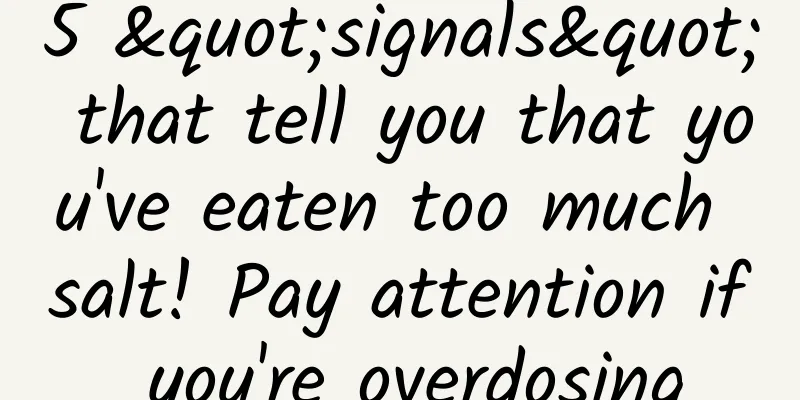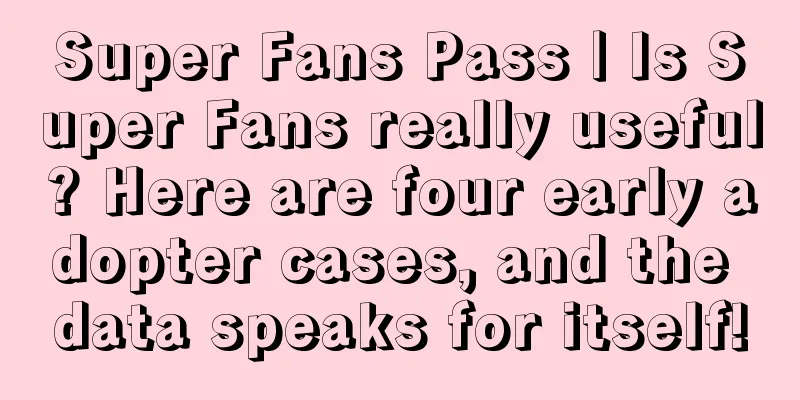5 "signals" that tell you that you've eaten too much salt! Pay attention if you're overdosing

|
People who often pay attention to health know that "you can't eat too salty" Also deliberately control salt intake So What happens to your body if you eat too much salt? How to limit salt effectively? 5 "signals" that tell you you're eating too much salt In daily life, how can you know if you have eaten too much salt? The body will give you 5 signs: 01 Dry mouth After eating a sodium-rich meal, your body senses that the salt and water levels are out of balance, and to restore the balance, your brain sends thirst signals, prompting you to drink more water. 02 Slower reaction If you eat too much salt for a long time, it may cause dehydration. Once a person is dehydrated, he cannot think clearly and often has slow reactions. 03 Fingers become thicker If you suddenly find that your fingers can no longer fit into rings that were originally the right size even though you haven't gained any weight, this may be caused by water retention. 04 Headache Studies show that adults who consume 3,500 mg of sodium per day have nearly a third higher risk of developing headaches than those who consume 1,500 mg of sodium per day. Image source: Gaoding Design 05 Frequent urge to urinate Drinking too much water can make you urinate more often, and eating too much salt can have the same effect. When the body takes in too much salt, the kidneys have to work overtime to excrete the excess salt from the body, which leads to more urination. Image source: Gaoding Design Eating too much salt can be very harmful! 01 Affects blood pressure Data from a study published in the journal Hypertension in 2018 showed that people who eat more salt have higher blood pressure, regardless of how healthy their overall diet is. Image source: Gaoding Design In other words, no matter how nutritionally balanced your diet is, as long as you have a "heavy taste", you are likely to be targeted by "high blood pressure". 02 Affects the skin Excessive salt will destroy the blood osmotic pressure, causing an increase in sodium ions in the body and water loss, making the skin dehydrated, increasingly rough, and with more wrinkles and spots. 03 Impact on immunity A study from the University of Bonn in Germany found that mice fed a high-salt diet suffered more severe bacterial infections. In addition, human volunteers who consumed an extra 6 grams of salt per day (equivalent to the salt content of two fast food meals) also showed obvious immune deficiencies. In other words, excessive salt intake can significantly weaken the function of the immune system. 04 Affects the brain The "Scientific Research Report on the Dietary Guidelines for Chinese Residents (2021)" points out that high salt (sodium) intake can increase the risk of stroke. In 2012, the World Health Organization conducted a systematic review of a cohort study of more than 70,000 adults and found that compared with the control group, the high sodium intake group had a 24% increased risk of stroke and a 63% increased stroke mortality rate. Image source: Gaoding Design 05 Affects bones If you eat too much salt, your kidneys will excrete the excess sodium ions, but the process of excreting sodium ions will also cause the body to excrete calcium ions. The more salt you eat, the more excess sodium you excrete, and the greater your calcium consumption, which will eventually affect the need for healthy bones. If calcium is constantly lost from the body and you don't take in enough calcium, it will lead to osteoporosis. 06 Affects the stomach Eating high-salt, barbecued, and pickled foods are all high-risk factors for gastric cancer. The high osmotic fluid in salt can damage the gastric mucosa. Image source: Gaoding Design Remember: each person should not consume more than 5 grams of salt per day! The "Dietary Guidelines for Chinese Residents (2022)" recommends that adults consume no more than 5 grams of salt per day. So how can we avoid "eating too salty" in daily life? Actually, there is a way! 01 Use a salt limiting spoon: Adding sugar when cooking will mask the saltiness, so you cannot judge whether there is too much salt by tasting alone, but should use a measuring tool. 02 Add salt when almost done: When cooking, add salt just before serving, so you can reduce the amount of salt while maintaining the saltiness. 03 Use spices and low-salt seasonings: They can increase the taste of food and reduce the use of salt, such as vinegar, onion, tangerine peel, lemon, onion, ginger, garlic, etc. Image source: Gaoding Design 04 Learn to read the ingredient list: When buying processed foods, you should learn to look at the "sodium content" in the ingredient list. Many foods are "invisible salt" foods. For example, ham, melon seeds, salted duck eggs, mustard tuber, noodles, sweet mooncakes, white bread, etc. Some of them don't even taste salty, such as sweet mooncakes. Image source: Department of Clinical Health, Run Run Shaw Hospital |
<<: It’s the beginning of autumn, why don’t you go to the grassland?
>>: The world's first! Chinese scientists reveal details of its birth
Recommend
Hamburger button transition animation implemented in Swift
Source code introduction: A beautiful hamburger b...
How to operate content for non-content products: The core lies in content presentation and recommendation
Content presentation and content recommendation a...
There will be heavy to torrential rain in northern Hubei and other places. Which areas will be affected by the torrential rain?
There will be heavy to torrential rain in norther...
Apple can’t escape the law of true fragrance: iOS 16 will be embedded with a large number of advertisements, will you buy it?
I once saw someone say in a forum: The only reaso...
A condiment that many people can’t stop eating and are addicted to. Thank you, Shanxi people!
For most people, vinegar is probably a condiment ...
BYD Han sales continue to lead the domestic mid-to-large sedan market, with monthly sales exceeding 12,000 units
Since its launch, BYD Han's sales have been r...
How does Meituan trick its members?
The Double 11 and Double 12 carnival is over, are...
360 Mobile executives make their debut: Zhou Hongyi fights Lei Jun again
96 days after injecting US$409 million into Coolp...
A brief analysis of the charm of the "Canyon Treasure Hunt" event planning in King of Glory
The 2nd anniversary celebration of Honor of Kings...
Huawei AppGallery Brand Resource Bidding Promotion Service Rules
These rules are based on the Huawei Developer Ser...
Web3.0--Introduction to Decentralized Identity DID
Part 01 Internet identity 1.1 Internet identity c...
Practical guide to Tencent advertising marketing!
Advantages of Tencent Trading Site 1. Expanding e...
How does the gaming industry advertise on Weibo?
How to correctly direct traffic during the promot...
Android Tencent Video v7.9.3 removes ads and unlocks Blu-ray quality_Taoduoduo
Go to play video ads Remove some advertising push...
As the tenth anniversary approaches, should the new iPhone be conservative or radical?
Tim Cook previously stated that the iPhone 7 seri...









